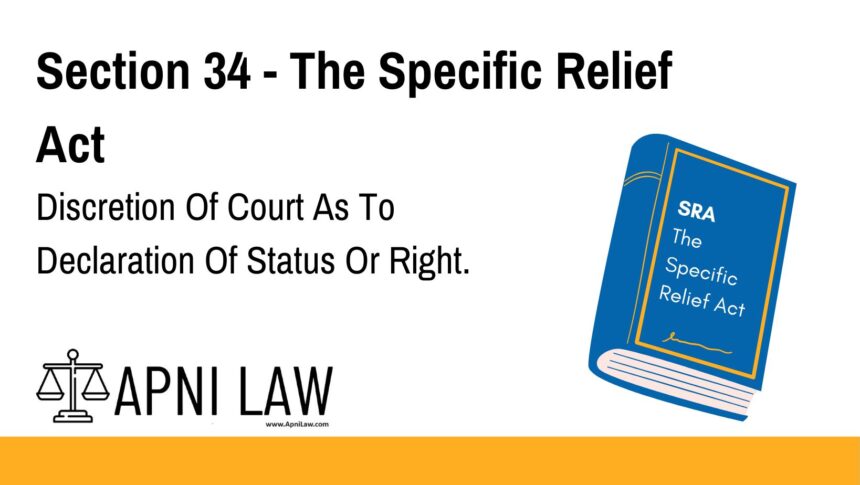Code: Section 34 – The Specific Relief Act
34.
Any person entitled to any legal character, or to any right as to any property, may institute a suit against any person denying, or interested to deny, his title to such character or right, and the court may in its discretion make therein a declaration that he is so entitled, and the plaintiff need not in such suit ask for any further relief:
Provided that no court shall make any such declaration where the plaintiff, being able to seek further relief than a mere declaration of title, omits to do so.
Explanation: A trustee of property is a “person interested to deny” a title adverse to the title of someone who is not in existence, and for whom, if in existence, he would be a trustee.
Explanation of Section 34 – The Specific Relief Act
Section 34 allows a person who is entitled to a legal character or right related to property to file a suit against someone denying or challenging their right to such character or property. The court has the discretion to issue a declaration confirming the plaintiff’s entitlement to that character or right. The plaintiff is not required to seek further relief, such as compensation or damages, in the same suit.
However, the court will not grant such a declaration if the plaintiff, while being able to seek further relief, fails to do so. The Explanation clarifies that a trustee, who holds property on behalf of someone who is not alive or is not yet born, is also considered someone who could deny the title of an existing person, in cases where the title is adverse to that of a person who would otherwise be the beneficiary.
Illustration
Example 1: Legal Declaration of Right
A person claims ownership over a property, but another individual denies this right. The person entitled to the property can file a suit seeking a declaration of ownership under Section 34. The court, at its discretion, can declare the plaintiff’s right to the property, without needing to address further issues like possession or compensation.
Example 2: Trustee Denying Title
A trustee of a deceased individual’s property denies the title of a living relative who would inherit the property if the trustee’s claim is dismissed. The court, in this case, can declare the living relative’s entitlement to the property under Section 34, acknowledging the trustee’s opposition as an interest in denying the title.
Common Questions and Answers on Section 34
1. Can the court grant a declaration without any further relief?
- Answer: Yes, the court can grant a declaration of the plaintiff’s legal right or title without requiring any further relief, such as compensation, unless the plaintiff has the ability to seek additional relief and omits to do so.
2. What does the Explanation in Section 34 mean?
- Answer: The Explanation refers to situations where a trustee, who holds property on behalf of someone who isn’t yet born or deceased, may be considered a “person interested to deny” the title of an individual who would be entitled to the property if the trustee’s claim is invalidated.
3. What happens if a plaintiff has a right to further relief?
- Answer: If a plaintiff could have sought further relief, such as compensation or damages, but fails to do so, the court will not grant a declaration under Section 34.
Conclusion
Section 34 of The Specific Relief Act provides a legal framework for individuals seeking to affirm their rights or legal character in relation to property or other matters, especially when someone denies those rights. The court has the discretion to make such declarations, ensuring that legal clarity is achieved for those whose rights are contested. However, it requires that the plaintiff does not overlook seeking further relief if it is available to them.








